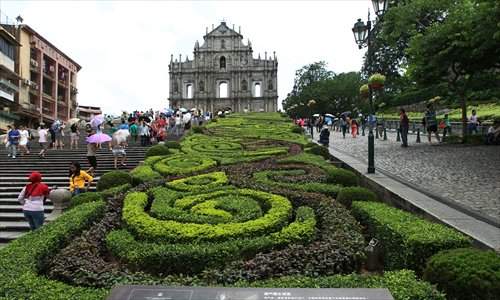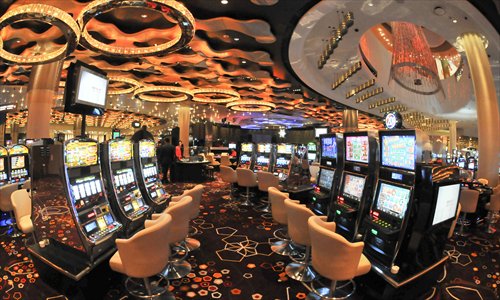Macao’s relations with mainland strong despite Hong Kong protests
Fifteen years after Macao's handover to Beijing, Xi Jinping will visit the Special Administrative Region for a ceremony on Saturday. Why has the gambling port remained quiet while neighboring Hong Kong has erupted in protest?

Tourists visit the Ruins of St. Paul in Macao. Photo: CFP
"Macao is an ever-evolving city, but what remains unchanged is that we adapt to changes in environment," said Antonio Ng, 29, a local resident who has witnessed his hometown's rapid changes in the past 15 years since its return to China.
The Special Administrative Region is poised to celebrate on Saturday its handover back to China, when President Xi Jinping will visit Macao for the first time since taking office in 2012. Xi's expected presence has been described by observers as "major recognition of Macao's development" as the city has been dubbed a successful model of the "One Country, Two Systems" for its stellar economic performance and political stability.
As Macao's handover anniversary follows the end of rising anti-mainland two-month Occupy protest in neighboring Hong Kong, many have wondered why Macao's relations with the mainland seem so much better.
Gambling and building
Ng spoke nostalgically as he walked past the Senate Square, part of the UNESCO World Heritage site, the Historic Centre of Macao. He contrasted the glitz and glamour of the gambling industry is Macao's well-preserved historical architecture and ordinary people's hardworking daily life.
"Macao has changed a lot, particularly in the last five to 10 years. Every time I came back there were new casinos built. I was fascinated by all those changes," Ng told the Global Times.
To the young resident, Macao is a city in the making, with construction everywhere. Before he came back to Macao in 2011 to start his career in the government, Ng went to study in Taiwan and Hong Kong since 2003, a year after the Macao government opened up the casino market in 2002. "It was when all the changes started to emerge," he said.
Macao had become a very different place when Ng returned in 2011, as it has transformed from what he described as a "small village" before the handover to a high-flying city with mega gaming hubs equipped with luxury hotel clusters and private jet airports.
The quality of life has improved among ordinary Macao residents too, said Ng as he sat down to take a sip of coffee. "Small cafes like this have sprung up in recent years as we have earned more and spent more on leisure and luxury."
Growing alongside the number of casinos is Macao's GDP and its people's purchasing power. As it became the world's largest gambling center in 2006, it has become one of the world's richest cities with the highest GDP per capita by purchasing power parity as of 2013, according to the World Bank.
Macao now rakes in seven times the revenue of Las Vegas, with gaming accounting for 80 percent of the city's income.
This pillar industry has given Macao one of the lowest unemployment rates in the world, as the unemployment rate has dropped from 6.8 percent in 2000 to 1.7 percent in 2014, reported the Macau Daily Times.
"The development of tourism depends heavily on policy support. Macao's economy would not enjoy such rapid development if it wasn't because of a series of assisting policies from the central government," Maria Helena de Senna Fernandes, Director of Macao Government Tourist Office, told the Global Times.
Macao's visitor numbers experienced rapid rise after the Macao government ended the monopoly system, granted licenses to three major casinos in 2002 and started the Individual Visit Scheme in 2003, said Fernandes.
"It has not been an easy path. Before the handover, and around 1997 to 1999, many people didn't feel certain about Macao's future as it was plagued with a high crime rate and sluggish economy. The tourism industry was hit hard by the SARS epidemic outbreak in 2003. Like Hong Kong, the supporting policy from the Chinese mainland has helped immensely with Macao's rebound," she said.
Fernandes added that although there has been a drop in tourists from Europe and the US in recent years due to financial crisis, visitor numbers from the Chinese mainland and nearby regions are still going strong, with mainlanders eager to gamble - a practice forbidden in the rest of the country.
"Political stability is the key to Macao's economic development which ensures social stability. The One Country Two Systems have maximized Macao's development potential. Xi's attendance at its 15th handover anniversary has proven the central government's recognition for its achievement as a model to uphold the Basic Law and One Country Two Systems," Leng Tiexun, deputy director of One Country Two Systems Research Institute with Macao Polytechnic Institute, told the Global Times.
While many have expressed concerns whether Hong Kong's recent volatility has impacted the politically stable Macao, Leng believes the nature of Macao's society could prevent any copycat mass protest from happening.
"Unlike the situation in Hong Kong, there is a much stronger presence of groups which 'love the country and love Macao,' and they serve as the communication platform between the Macao people and its government," said Leng.
Although there was an unprecedented protest took place in May against a controversial bill to give generous retirement packages to the outgoing chief executive, Leng said the rally was still largely peaceful and calm.
Si Kalon, a Macao lawmaker believes the progress made in Macao's political and social system on the back of the Chinese mainland has ensured Macao's social stability.
"The Macao government led a political reform in 2012 to increase the numbers of nominating committee members. The number of directly elected lawmakers has also been increased since the handover," Si told the Global Times.
Improvements made in education, medical, housing and social security systems are also conducive in providing a stable environment in Macao. Since 2008, the Macao government even started handing out cash for its residents due to the huge surplus in government revenue.
A better legal framework and governance structure has been another important aspect of safeguarding Macao's stable development, said Mo Shijian, dean of its Faculty of Law with the University of Macao.
"There was not an established legal system in Macao until the handover, when a much more comprehensive framework of rules and regulations were set up. Education for training legal professionals was also absent before 1999," Mo told the Global Times.
Mo believes the longer history of legal education in Hong Kong has nurtured much more mature narrative and tactics used by the opposition leaders to instill the ideologies and values they believe into the public's mind.
Mo, however, believes these seemingly convincing values and principles are only excuses used by the Hong Kong protest leaders to keep Hong Kong from integrating with the mainland.
"Macao people have chosen cooperation instead of opposition, as majority of its gaming revenue comes from the Chinese mainland. As an SAR, we have to respect the country's sovereignty and systems, and try to strike a balance between regional interest and the whole country," said Mo.
The Macao government has also been more effective at managing opposition voices, and maintaining peace and social order, Mo added.
Hong Kong's recent Occupy protests was first raised by Benny Tai Yiu-ting, a law professor, to advocate that the list of candidates for Chief Executive in the 2017 election should be open rather than requiring approval from Beijing. A two-month long protest has paralyzed parts of Asia's financial heart since September 28, with occasional outbreaks of violence between protesters and the police.

Casinos in Macao have been hard-hit by China's anti-corruption campaign. Photo: CFP
Crowded streets
Days ahead of the imminent handover anniversary, streets in the city center of Macao has been crowded as usual with a mix of local residents, casino regulars and sightseeing visitors. Some local political parties have set up booths to rally people to join a protest they organized on Saturday to demand democracy and improvements in government policies, but they have attracted little attention as most of the commuters passed by the stalls without laying their eyes on them.
"Like Hong Kong, there has been some influence from Taiwan's recent politically-motivated "Sunflower Movement" in Macao. But most of Macao's people are still confident in the new government's ability in bringing new changes again to society. Macao is such a small place that it could not afford the damage brought by such mass scale protests like the one in Hong Kong," said lawmaker Si.
Macao's GDP fell 2.1 percent in real terms in the third quarter from a year earlier, shrinking for the first time since the global financial crisis five years ago, as a result of China's high-profile anti-corruption movement that deterred corrupt officials from visiting casinos in Macao. Gambling revenue has fallen for six straight months after a five-year winning streak without even a single down month.
The recent slowdown in Macao's gaming business has propelled the region into a new phase of closer exchange with the Chinese mainland to diversify its economy with new development plans.
Echoing a statement of Li Fei, a top Chinese official for Hong Kong and Macao affairs, earlier this month that Macao should "explore a fresh development plan," the SAR's tourism chief Fernandes said Macao has already been working to expand its exhibition and convention industry, as well as its cultural and innovation sector, and the Traditional Chinese Medicine industry.
For better economic exchange with its neighboring Hengqin Island in Guangdong Province, the border crossing between Macao and Hengqin Island has started from Thursday to operate on a 24-hour basis.
Ng said although the influx of mainland tourists has made life of Macao people more hectic and small shops are gradually giving way to big retail chains, plus the high rates of inflation, he would still prefer development and integration with the Chinese mainland for new opportunities.
"Macao people are less radical and more peaceful than Hong Kong people. We tend to consider the big picture and will think of how to balance relations between the SAR and the central government. Macao is not without problems, but most of us still lead a relatively comfortable life, and we are not used to complaining as much as Hongkongers," said Ng, the young resident.
"It is inevitable that we will have to eventually reach out from this small place to expand for wider prospect in development," he said.
Newspaper headline: Peaceful islands